| You are here: | Home > Bhutan > Topics > Politics > Elections 2008 > Mock election 2007 > May 2007 | Search |
 |
| Bhutan - Politics |
| Election 2008 |
|
 |
| Mock Elections: 40 percent vote in mock general election in May 2007 |
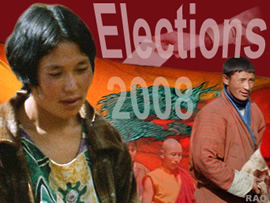 |
|
"The mock election was aimed at familiarising voters and officials on the election procedures ahead of the elections next year and we have succeeded in doing that."
He added that the general election was a success in terms of the election procedures, the voting machines, voter participation and communicating the election result.
Out of 400,626 voters that would be eligible to vote by 2008, 283,506 had registered for the final round of the mock election. Considering only the registered voters the voter turn out in the general election was 57.14 percent as compared with 50.92 percent in the primary round of the mock election.
The Druk Yellow Party whose manifesto was based on preservation of culture and tradition won a landslide victory winning in 46 of the 47 constituencies. The Druk Red Party for industrial led development won the only seat from the Bartsham-Shongphu constituency in Trashigang.
The result was declared around 10:00 pm on the same day of poll.
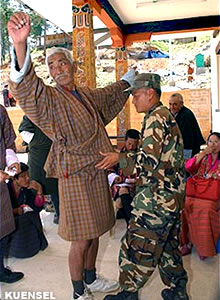 |
|
The deputy CEO tsaid that a review meeting is scheduled for today in Wangdue Phodrang with the officers who were on election duty to evaluate the general election and report the findings to the ECB.
However, voter turn out in Samdrup Jongkhar in eastern Bhutan decreased by a percent, according to Samdrup Jongkhar CEO, Dzongda Sangay Dorji.
According to election officials, although registered voters without the Voter Photo Identity cards could use their citizenship ID cards to vote, some ID cards of the voters were damaged and details were not clear. This, Samdrup Jongkhar CEO said, could have contributed to the drop in turnout in Samdrup Jongkhar.
The Thimphu CEO, Dzongda Chencho Tshering, also said that the conduct of the final round was definitely an improvement over the primary round. "Voter turnout in Thimphu Throm was almost the same as the primary round but the whole election procedure went very smoothly," he said.
He said that verifying details of the registered voters at the polling stations was difficult and time consuming in the primary round but this was solved in the general election with the introduction of computers at the polling stations.
People who worked in other districts were also the ones who did not show up for the mock election. A few students studying in other districts however did turn up for the mock election.
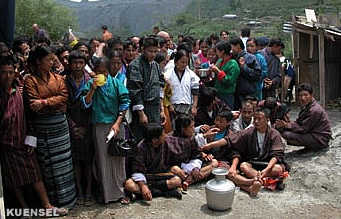 |
|
"A lot of things were corrected after evaluating the primary round," he said. "The polling stations were increased by three and few polling stations were relocated and it made a big difference."
The deputy CEO tsaid that a review meeting is scheduled for today in Wangdue Phodrang with the officers who were on election duty to evaluate the general election and report the findings to the ECB.
All densely populated polling stations will have a computer each in the real elections, according to election commission officials.
Dasho Kunzang Wangdi said that to find out what more had to be done for the smooth election process next year, the whole mock election had to be evaluated once again.
"The revisions we made after observing the first round was very helpful," he said. "Closing the private establishments on the poll day till 5 pm and conducting the election on a weekday made a difference with more participation."
However, some business establishments in Thimphu said that with most of their staff gone away for days to their dzongkhag to vote their businesses were going haywire. "My hotel is full of guests but I have no staff," said a Thimphu hotelier.
The election commission will conduct a post poll analysis soon after receiving feedbacks from the national and international observers and electoral officers to identify areas that need strengthening before the real elections.
| Contributed by Phuntsho Choden, Bhutan's National Newspaper, May 2007 |
| Which is your party? |
What is the driving force behind a prospective political candidate's decision to align with a particular party? Is it the likeliness of victory? Is it the promise of a ministerial berth? Is it assured leadership that is yet to declare itself?
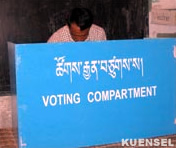 |
|
According to party officials of the People's Democratic Party (PDP), the party's Constituency Committee would nominate their candidates, but there was already a handful of people who have declared that they would contest for the party.
A spokesperson for the Bhutan People's United Party(BPUP) had earlier said that they would identify their candidates after they finalise their manifesto.
Generally, an interested candidate would join a party depending on how they view a party's ideas and beliefs, but without the manifestos, observers say that 'clear visibility of a party leader' could also be the reason at the moment.
"I believe in a strong and credible leadership," said a possible candidate from Trashigang, who has joined PDP. "Going by the people who are joining the party, I see a strong team," he added. Another possible candidate had been quoted saying that he chose to run for PDP because the party is 'led by a person known for his service.'
A third PDP candidate said that in choosing a party the most important thing was the trust and confidence of the people in the party. "PDP is more democratic in its establishment and I did think hard before choosing it," he said.
The justification stands given that many people think that more and more people would join BPUP if a notable minister leads the party. But there are others who feel that joining a party based on personality could send the wrong message.
"I wouldn't go for personality," said a civil servant waiting to join a party. "I am waiting for the parties to announce their manifestos. I would look into the visions and aspirations of the party, take it to the people and see if they would agree to it before joining," he said.
An analyst said that from his close interactions with the possible candidates, he became skeptical of their interest and motives. "Many didn't have answers when I asked them what would they do if their ideologies deviated from that of the party they are joining," he said. "This shows that they are joining for other reasons."
"In most case people were approached and it is a top down approach," he said. "This means both the party and the candidates are not prepared. When the choices are clear, people should make reasoned judgment."
Another observer pointed out that the possible candidates, mostly civil servants, made a calculative move in choosing their party. "They have already made a bold move by sacrificing their jobs," he said. Given the risks it is a reasonable calculation to align with a party that would win votes and then win a seat for you."
However, notwithstanding the party they choose with or without understanding the parties, observers also appreciate the movement from the civil service to politics. "They are responding to the need of the country," said an observer. "There should be more people declaring, especially the ministers to lead or form new parties so that people would be offered more choices," he said.
"To have a healthy democracy there should be more parties and any serving minister forming a party would inject impetus to the democratic process," said a former lecturer. "Ministers joining politics is the need of the hour," he said."
| Contributed by Ugyen Penjore, Bhutan's National Newspaper, May 2007 |
| Trashigang: Serious about voting |
On the day of the election, he left his sick wife home and walked to the polling station at Galing Primary School.
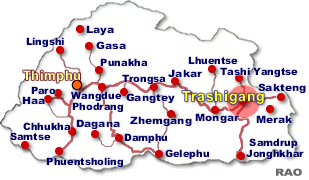 |
|
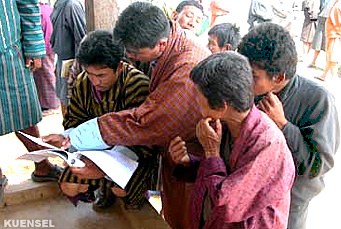 |
|
Those who could not sought help from them and cast their votes.
Some villagers also tsaid that electoral officials at the station briefed them properly before they began polling. Few said they discussed about the event with their children settled in Thimphu and that helped them better understand the procedures.
"We are now well equipped with the procedural knowledge," said Sangay Dorji from Pangthang. "The real challenge lies ahead when we have to vote during the historical elections next year."
Tshewang from Dungman said that he cast his vote after a proper study of the manifestos and not simply for the sake of voting. "I tried my best to make my friends and villagers do the same. We cannot afford to make mistakes in future," he said.
While the voters turn out had increased compared with the primary mock session held in April 21, it was noticed that many voters had also come from outside the gewog including Trashigang, Kanglung, and Yonphula. Few had also come from other districts like Trashiyangtse, Trongsa, Thimphu, and as far as Samtse.
Yeshey and Dorji Gyeltshen from Changmey, who had taken a bus ride from Trongsa, said they could not attend the previous election and felt it was necessary to be present this time. "It is going to be an important occasion and we do not want to be left out," said Yeshey. "Our votes can make difference."
However, a voter who had come from Thimphu said that upon reaching his village, he realised that only the villagers were taking mock elections seriously.
"I found that many of the employed eligible voters were under the impression that mock elections were not meant for them," he said. An electoral officer, who chose anonymity, said that some of the literate voters were less aware of the voting procedures than the villagers.
According to the dzongkhag electoral officer, Sonam Wangda, besides having voters coming from outside, there was also an increase in the number of postal ballots.
"It increased from 326 during the primary mock election to 1,244 in the general round," he said, adding that most of the postal ballots had to be turned down as it arrived after the deadline. "Otherwise it could have crossed 3,000," he said.
Meanwhile, he said that there was an increase of five percent in the voters' turnout number totaling to about 15,865 in the dzongkhag.
Bartsham-Shongphu constituency had 21 polling stations, the highest in the dzongkhag, followed by Radhi-Phongmey and Samkhar-Kanglung constituencies with 20 polling stations each. While Wamrong had 14, Kangpara-Thrimshing constituency had 12 polling stations.
| Contributed by Kesang Dema, Bhutan's National Newspaper, May 2007 |
| Trongsa: Whom to cast for? |
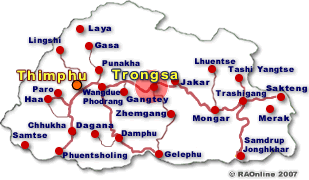 |
|
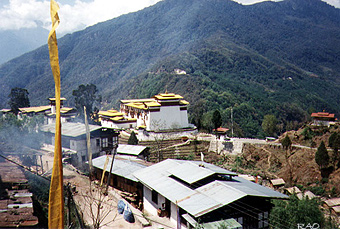 |
|
Thinley Choden, a student studying in Delhi, India, said she voted for the red party - industrial led development.
"Industrial development is the key to prosperity and economically vibrant future for our country. We need the prosperous, economically independent Bhutan," said Thinley Choden.
Lhawang Norbu, 58, from Mongar gewog voted for Druk Yellow Party because it signified unity of the country through preservation of tradition, culture and values.
A carpenter who works at a sawmill in Haa managed to reach Mongar at 3 pm on Monday to cast his vote. But he could not do so because polling at the designated booth was over by around 12 noon.
In the mock general election on Monday, 14,765 voters voted through 77 polling stations in the Dzongkhag, according to a polling officer.
Mongar has 30,000 eligible voters of which 29,000 have registered so far.
| Contributed by Tshering Wangdi, Bhutan's National Newspaper, May 2007 |
| Mongar: Whom to cast for? |
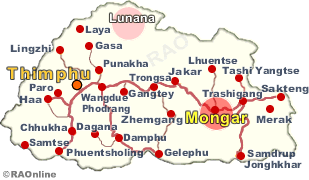 |
|
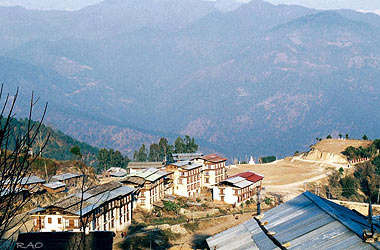 |
|
Many voters tsaid that in the primary round, they pressed the button on the electronic voting machine more out of convenience than choice.
Choki Wangmo, 37, from Kaba said that she pressed the first button of the voting machine and so did most of her friends. The only people who understood the whole election process were the Tshogpas. "It's just a mock election and we need not take it seriously," said Pang Tshogpa, Namgay.
A few students of Sherubling Higher Secondary School who attended the general round of mock election also seemed confused. "I read the manifestoes but didn't understand much from it," said a class IX student, Jamyang.
According to the election officer of Trongsa dzongkhag, Dawa, election staff did two rounds of voter's education and covered all the chiwogs in the dzongkhag.
"We expected all the people to be aware of the election and voting process," he said.
But voters said that only one member from each household attended the voter's education programme and they were never explained about the procedures.
Of the 10,435 eligible voters in Trongsa 9,502 had registered according to the electoral registration officer, Wangchuk Tempa.
| Contributed by Tashi Dema, Bhutan's National Newspaper, May 2007 |
| Thimphu experience |
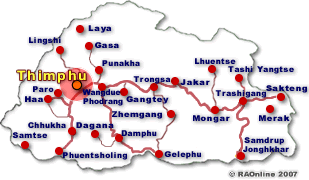 |
|
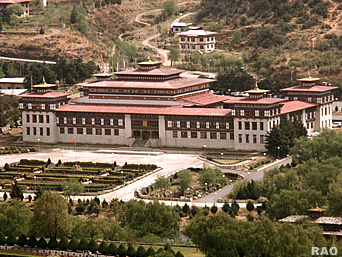 |
|
Yeshey, a corporate employee, from Trongsa couldn't vote as she had no one to look after her three children if she went all the way to Trongsa. "And I am not sure if I would be able to vote next year," she said.
Payden, who is from Trashigang said that she would definitely vote next year although she couldn't do it during the mock election. "Just because I didn't vote this time, it doesn't mean I am not concerned. More than anything I think it is important that we press the right button next year," she said
| Contributed by Kinga Dema, Bhutan's National Newspaper, May 2007 |
| Links |
| External Links |
|
 |
|
|